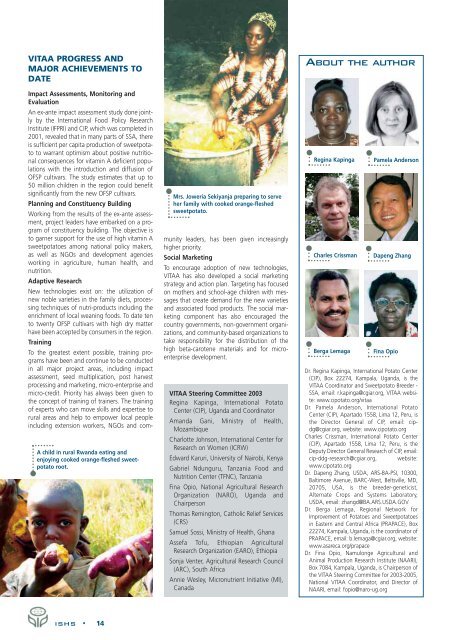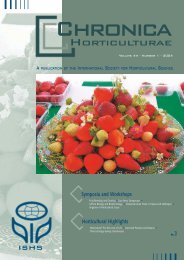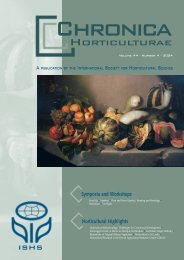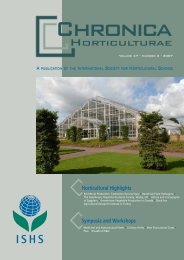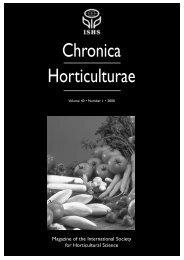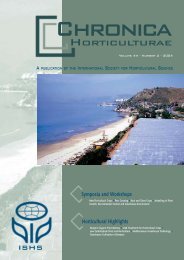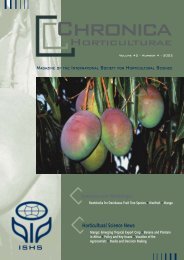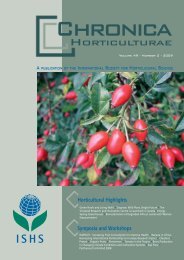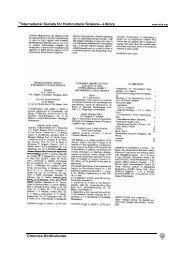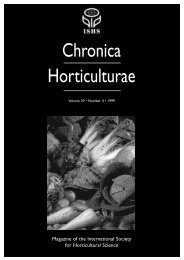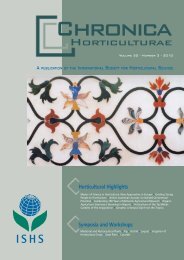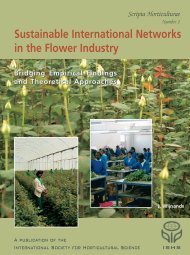Chronica - Acta Horticulturae
Chronica - Acta Horticulturae
Chronica - Acta Horticulturae
You also want an ePaper? Increase the reach of your titles
YUMPU automatically turns print PDFs into web optimized ePapers that Google loves.
VITAA PROGRESS AND<br />
MAJOR ACHIEVEMENTS TO<br />
DATE<br />
Impact Assessments, Monitoring and<br />
Evaluation<br />
An ex-ante impact assessment study done jointly<br />
by the International Food Policy Research<br />
Institute (IFPRI) and CIP, which was completed in<br />
2001, revealed that in many parts of SSA, there<br />
is sufficient per capita production of sweetpotato<br />
to warrant optimism about positive nutritional<br />
consequences for vitamin A deficient populations<br />
with the introduction and diffusion of<br />
OFSP cultivars. The study estimates that up to<br />
50 million children in the region could benefit<br />
significantly from the new OFSP cultivars.<br />
Planning and Constituency Building<br />
Working from the results of the ex-ante assessment,<br />
project leaders have embarked on a program<br />
of constituency building. The objective is<br />
to garner support for the use of high vitamin A<br />
sweetpotatoes among national policy makers,<br />
as well as NGOs and development agencies<br />
working in agriculture, human health, and<br />
nutrition.<br />
Adaptive Research<br />
New technologies exist on: the utilization of<br />
new noble varieties in the family diets, processing<br />
techniques of nutri-products including the<br />
enrichment of local weaning foods. To date ten<br />
to twenty OFSP cultivars with high dry matter<br />
have been accepted by consumers in the region.<br />
Training<br />
To the greatest extent possible, training programs<br />
have been and continue to be conducted<br />
in all major project areas, including impact<br />
assessment, seed multiplication, post harvest<br />
processing and marketing, micro-enterprise and<br />
micro-credit. Priority has always been given to<br />
the concept of training of trainers. The training<br />
of experts who can move skills and expertise to<br />
rural areas and help to empower local people<br />
including extension workers, NGOs and com-<br />
A child in rural Rwanda eating and<br />
enjoying cooked orange-fleshed sweetpotato<br />
root.<br />
Mrs. Joweria Sekiyanja preparing to serve<br />
her family with cooked orange-fleshed<br />
sweetpotato.<br />
munity leaders, has been given increasingly<br />
higher priority.<br />
Social Marketing<br />
To encourage adoption of new technologies,<br />
VITAA has also developed a social marketing<br />
strategy and action plan. Targeting has focused<br />
on mothers and school-age children with messages<br />
that create demand for the new varieties<br />
and associated food products. The social marketing<br />
component has also encouraged the<br />
country governments, non-government organizations,<br />
and community-based organizations to<br />
take responsibility for the distribution of the<br />
high beta-carotene materials and for microenterprise<br />
development.<br />
VITAA Steering Committee 2003<br />
Regina Kapinga, International Potato<br />
Center (CIP), Uganda and Coordinator<br />
Amanda Gani, Ministry of Health,<br />
Mozambique<br />
Charlotte Johnson, International Center for<br />
Research on Women (ICRW)<br />
Edward Karuri, University of Nairobi, Kenya<br />
Gabriel Ndunguru, Tanzania Food and<br />
Nutrition Center (TFNC), Tanzania<br />
Fina Opio, National Agricultural Research<br />
Organization (NARO), Uganda and<br />
Chairperson<br />
Thomas Remington, Catholic Relief Services<br />
(CRS)<br />
Samuel Sossi, Ministry of Health, Ghana<br />
Assefa Tofu, Ethiopian Agricultural<br />
Research Organization (EARO), Ethiopia<br />
Sonja Venter, Agricultural Research Council<br />
(ARC), South Africa<br />
Annie Wesley, Micronutrient Initiative (MI),<br />
Canada<br />
ABOUT THE AUTHOR<br />
Regina Kapinga<br />
Charles Crissman<br />
Berga Lemaga<br />
Pamela Anderson<br />
Dapeng Zhang<br />
Fina Opio<br />
Dr. Regina Kapinga, International Potato Center<br />
(CIP), Box 22274, Kampala, Uganda, is the<br />
VITAA Coordinator and Sweetpotato Breeder -<br />
SSA, email: r.kapinga@cgiar.org, VITAA website:<br />
www.cipotato.org/vitaa<br />
Dr. Pamela Anderson, International Potato<br />
Center (CIP), Apartado 1558, Lima 12, Peru, is<br />
the Director General of CIP, email: cipdg@cgiar.org,<br />
website: www.cipotato.org<br />
Charles Crissman, International Potato Center<br />
(CIP), Apartado 1558, Lima 12, Peru, is the<br />
Deputy Director General Research of CIP, email:<br />
cip-ddg-research@cgiar.org, website:<br />
www.cipotato.org<br />
Dr. Dapeng Zhang, USDA, ARS-BA-PSI, 10300,<br />
Baltimore Avenue, BARC-West, Beltsville, MD,<br />
20705, USA, is the breeder-geneticist,<br />
Alternate Crops and Systems Laboratory,<br />
USDA, email: zhangd@BA.ARS.USDA.GOV<br />
Dr. Berga Lemaga, Regional Network for<br />
Improvement of Potatoes and Sweetpotatoes<br />
in Eastern and Central Africa (PRAPACE), Box<br />
22274, Kampala, Uganda, is the coordinator of<br />
PRAPACE, email: b.lemaga@cgiar.org, website:<br />
www.asareca.org/prapace<br />
Dr. Fina Opio, Namulonge Agricultural and<br />
Animal Production Research Institute (NAARI),<br />
Box 7084, Kampala, Uganda, is Chairperson of<br />
the VITAA Steering Committee for 2003-2005,<br />
National VITAA Coordinator, and Director of<br />
NAARI, email: fopio@naro-ug.org<br />
ISHS • 14


